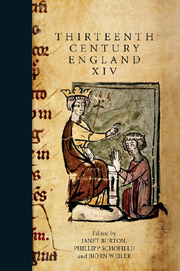Book contents
- Frontmatter
- Contents
- List of Figures and Tables
- Preface
- List of Contributors
- List of Abbreviations
- Politics and the People in Thirteenth-Century England
- Peasants, Litigation and Agency in Medieval England: the Development of Law in Manorial Courts in the late Thirteenth and Early Fourteenth Centuries
- Medieval Accounting Memoranda from Norwich Cathedral Priory
- The Seals of London's Governing Elite in the Thirteenth Century
- The Marriages of the English Earls in the Thirteenth Century: a Social Perspective
- Monks and Politics in Thirteenth-Century Wales and Catalonia
- Lope Fernández, Bishop of Morocco: His Diplomatic Role in the Planning of an Anglo-Castilian Crusade into Northern Africa
- On Kingship and Tyranny: Grosseteste's Memorandum and its Place in the Baronial Reform Movement
- St Edmund of Canterbury and Henry III in the Shadow of Thomas Becket
- Matthew Paris and the Royal Christmas: Ritualised Communication in Text and Practice
- Thomas of Lancaster in the Vita Edwardi Secundi: a Study in Disillusionment
- John and Henry III in the Anglo-Norman Prose Brut
- Genealogiae orbiculatae: Matthew Paris and the Invention of Visual Abstracts of English History
- The Genealogical Chronicles of Matthew Paris: Edition
Peasants, Litigation and Agency in Medieval England: the Development of Law in Manorial Courts in the late Thirteenth and Early Fourteenth Centuries
Published online by Cambridge University Press: 05 May 2013
- Frontmatter
- Contents
- List of Figures and Tables
- Preface
- List of Contributors
- List of Abbreviations
- Politics and the People in Thirteenth-Century England
- Peasants, Litigation and Agency in Medieval England: the Development of Law in Manorial Courts in the late Thirteenth and Early Fourteenth Centuries
- Medieval Accounting Memoranda from Norwich Cathedral Priory
- The Seals of London's Governing Elite in the Thirteenth Century
- The Marriages of the English Earls in the Thirteenth Century: a Social Perspective
- Monks and Politics in Thirteenth-Century Wales and Catalonia
- Lope Fernández, Bishop of Morocco: His Diplomatic Role in the Planning of an Anglo-Castilian Crusade into Northern Africa
- On Kingship and Tyranny: Grosseteste's Memorandum and its Place in the Baronial Reform Movement
- St Edmund of Canterbury and Henry III in the Shadow of Thomas Becket
- Matthew Paris and the Royal Christmas: Ritualised Communication in Text and Practice
- Thomas of Lancaster in the Vita Edwardi Secundi: a Study in Disillusionment
- John and Henry III in the Anglo-Norman Prose Brut
- Genealogiae orbiculatae: Matthew Paris and the Invention of Visual Abstracts of English History
- The Genealogical Chronicles of Matthew Paris: Edition
Summary
As more than one commentator has noted, and often from just beyond the area of direct study of the medieval English peasantry, the concentration of effort upon the study of the medieval peasantry has been directed in avenues that might loosely be described as social and economic. Furthermore, a great deal of the investigation of the medieval English peasantry has been based upon detailed analysis of one particular body of material: the records of the manorial court, the manorial court roll. These have been used in a wide variety of ways, to explore landholding, family structure, inter-tenant exchange, lord-tenant relations, and so on. It is striking, however, that relative to the bulk of work, especially that occasioned by the two most significant movements to have influenced the development of peasant studies for medieval England (Marxism; social science history), there has been relatively little work on the law contained within these courts.
Those historians attempting such an approach have more than once invoked the spirit of Maitland and identified their approach as a return to his important antecedents. Maitland, in his introduction to his Selden Society volume, Select Pleas in Manorial and Other Seigniorial Courts, spends a considerable extent of the introduction exploring the development of the manorial court and the relationship, chiefly in terms of jurisdictional boundaries, between the manor court and customary law on the one hand and the king's court and common law and statute on the other.
- Type
- Chapter
- Information
- Thirteenth Century England XIVProceedings of the Aberystwyth and Lampeter Conference, 2011, pp. 15 - 26Publisher: Boydell & BrewerPrint publication year: 2013



